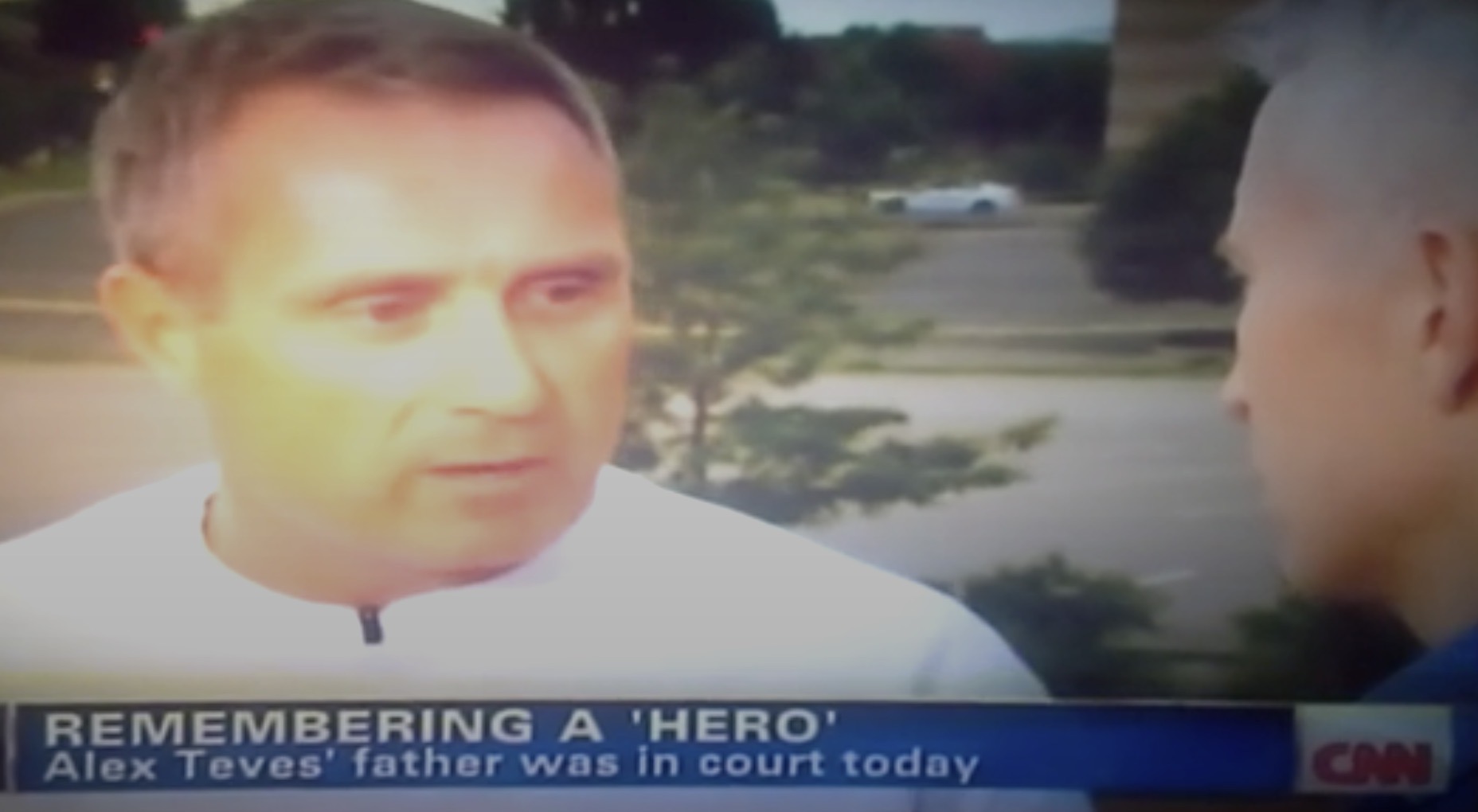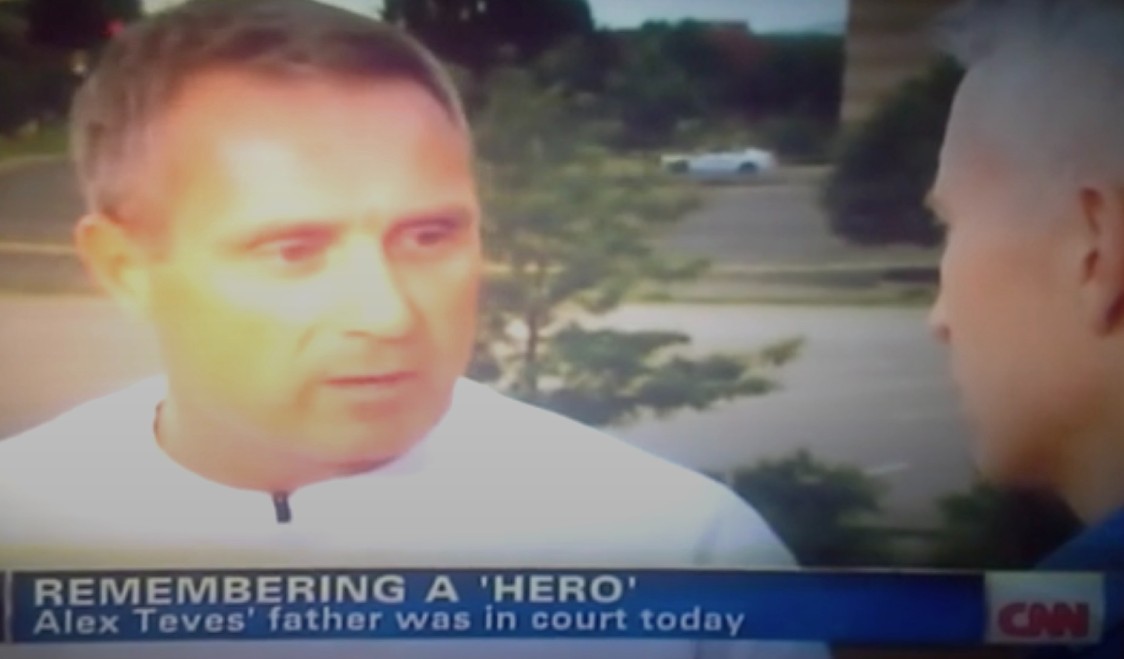When the friends and parents of Alex Teves attended his memorial service service 10 years ago, they all wore blue jeans and white t-shirts. It’s what Alex threw on most days before he left the house. Alex’s Dad, Tom Teves, said that his son was pretty easy going: “He was always more interested in relationships.”
The last act of 24-year-old Alex’s short life was shielding his girlfriend Amanda from a rain of bullets at a midnight showing of “The Dark Knight” in a Colorado movie theater. Amanda says it saved her life:
“I was confused, but Alex didn’t hesitate. Because I sat there for a minute not knowing what was going on, and he held me down and he covered my head and he said, ‘Shh. Stay down. It’s ok. Shh, just stay down.’ So I did.”
Not long after, Tom Teves was testifying in court about the killer who stole his boy’s life. That night, live on CNN, in a tone of voice that was at once fragile and furious, Tom challenged Anderson Cooper and the entire media landscape to take the kind of action that government can’t:
“These killers want to be on television. They want to be infamous. We can’t stop it — we can only get shot. But CNN, FOX News, the major networks, why don’t you all come out with a policy that says ‘we’re not gonna show this again. We realize we made a mistake. But just so this never happens again, here’s what we’re gonna do.’ And that would be my challenge to you and to every network, and let’s see who comes out with it first.”

To his credit, Cooper has been doing this for many years, and he explains it right on the air. Just 30 hours after the latest sick person killed 19 children and two adults in Uvalde, Texas, Cooper said this at the top of his program:
“As always, we’re not going to show you this person’s face or say this person’s name. If he wanted to become famous as a killer, we just don’t want any part of that. History should not remember this person’s name. Instead, we all should hear the names of all murdered here.”
The first time I remember having the very same thought as Tom Teves was right after another sick person snuffed out six lives with a Glock 34 in Santa Barbara in 2014. The 22-year-old posted a seven-minute video of himself sitting in his car and explaining his hatred of women and the revenge he was going to carry out the following day. It’s still online. I had to look it up to write this, and it is positively chilling. But more than that, it’s a clue and a cue to the media: This exposure is what they want. Tom explained it in a Ted Talk:
“These murderers are telling us they want to be famous like the murderers before them. And the media continues to give them exactly what they seek: Notoriety. The Sandy Hook murderer kept a spreadsheet of previous mass murderers — and their number of kills. The Orlando Pulse nightclub murderer called a local news station during his attack — then stopped to check Facebook to see if he’d gone viral. The Parkland murderer posted a video stating: ‘When you see me on the news, you’ll know who I am.’ And most telling, the Umpqua Community College murderer wrote on his blog about a previous mass murderer, saying: ‘I’ve noticed that people like him are all alone and unknown. But when they spill a little blood, the whole world knows who they are.’”
And it’s not just anecdotal. If you want the scientific data on this cause-effect reality, you can read the research conducted by criminologists Adam Lankford and Eric Madfis. Their conclusion tracks with Tom’s: “Media Coverage of Mass Shooters Increases Their Competition to Maximize Victim Fatalities.”
Two decades ago, I worked as a local TV reporter in California, Iowa and Illinois. I was that guy who you hear each night barking out the lead story on the violence du jour. I used suspects’ names and then when I covered their murder trials, I’d use them again and again. But in my final year on the air, I produced and reported an hour-long documentary that actually ripped local news for the sensationalistic way it covers violent crime — and I offered alternate courses for coverage. Right after NBC aired the doc, I quit TV news.
But I still watch a lot of national “news.” Too much, in fact. I’m trying to wean myself off. But when an ineffable tragedy like Uvalde happens, my viewing time goes into overdrive. A big reason for this is that I’m comparing and contrasting the ways in which the event is covered by different entities — including the inevitable, immediate political analysis.
The eternal debate over guns invariably floods the airwaves in the wake of these heart-crushing incidents. But it’s a stale political standoff. You’ll hear talking heads refer to the 90 percent of Americans who favor common sense curbs that will prevent or delay sick people from getting their hands on deadly firearms. Then you’ll hear the other side say that this wouldn’t work and to focus on the mental health problem in this country. Back and forth it goes.
I happen to be part of the 90 percent. But as I said, it’s a tired stage play and it doesn’t lead anywhere. There are real reasons why the 90 percent of Americans keep losing out, and I’ve explained it in no uncertain terms many times. But most people don’t want to read nuanced explanations for why our government doesn’t function effectively (on a ton of issues). People want to know what can be done right now.
Here’s the good news: There is something that we can do — outside of voting — that has the power to demotivate potential killers. We can take the advice of Tom Teves and his organization: No Notoriety. He says that in the eight years since he started No Notoriety and outlined simple guidelines for news entities — many of them have made progress. But ultimately, they’re driven by the number of eyeballs they attract, which translates into ad rates. They’re corporations. Therefore, Tom advises:
“The next time you see any media organization — print, digital, radio or television — gratuitously leveraging the names and images of these shooters, stop watching, stop listening, stop clicking, stop liking, and stop sharing. Write to the producers, editors, station managers and CEOs of these organizations. Take note of the advertisers who support those segments and write to their CEOs. Together, we can push the media to act in the interest of public safety, not profits.”
It’s ironic that the one act that really has the potential to strike at the root of the problem — these killers’ desire for infamy — can’t be perfomed by lawmakers. The real onus is on content creators — and, by extension, on we the consumers of their content.
What will you choose to read and watch?


